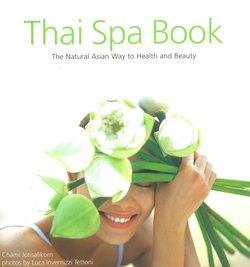Читать книгу Thai Spa Book - Chami Jotisalikorn - Страница 6
На сайте Литреса книга снята с продажи.
Оглавлениеthe thai spa experience
Thailand is the first choice retreat for well-travelled sybarites looking for stress-relief pampering—with silky smooth beaches and mouth-watering cuisine to boot. Everyone's heard of Thailand's famous spas, and the lucky ones have experienced their rejuvenating treatments, but what few realise is that the enticing menus at today's spas are formulated from ancient herbal healing traditions that have deep roots in Thai culture. Thai massage, for example, migrated from India with Buddhist monks and Brahmins in the 2nd and 3rd centuries BC; and the herbal heat compresses and Thai herbal steam are derived from folk medicine and ancient midwifery techniques.
The relaxing benefits of such blissful treatments are well known. But other than feeling fabulously indulged in the gentle hands of a soft-spoken Thai spa therapist, do these massages and herbal beauty therapies have real healing properties?
Elegant lines at the Lanna Spa, Regent Chiangmai Resort.
Teakwood pavilions come aglow when twilight falls at the Aman Spa, Amanpuri resort, Phuket.
Turmeric paste is cherished by Thais for its skin healing properties (above) while toning mask of cucumber (right) cools and revives.
The answer is a resounding 'yes'! The tradition of herbal healing in Thailand dates back for centuries; historical evidence suggests that the Thais practised an integrated system of medicine incorporating the Indian Ayurvedic system with Chinese practices, mixed with deep-rooted folk beliefs in the supernatural, mystical and astrological. The core philosophies of Thai medicine revolve around the balance among the four basic elements—earth, water, wind and fire—which comprise the essence of life, and appear as recurrent themes in many modern day spas.
Traditional massage and herbal remedies have cured the ailments of generations of Thais—that's why they're still in use today And even if some scientists scoff at such techniques, says herbal therapist and owner of the Thai Herbal Spa, Khun Komon Chitprasert: "Once you experience the healing abilities yourself, your beliefs change".
while toning mask of cucumber cools and revives.
The Bodhi tree is a spiritual decor motif at the Lanna Spa.
An outdoor treatment fanned by cooling sea breezes at the Aman Spa.
In recent years, Thai traditional healing has experienced a revival, in part due to the efforts of Khun Pennapa Sapcharoen at the Institute of Thai Traditional Medicine; as a result, an interesting trend is the emergence of innovative new therapies based on ancient lore. For example, Bangkok's Nakriya House of Health and Beauty offers a unique fat and cellulite-reducing herbal bath and massage invented by owner Khun Shelida Buranasiri, derived from ancient midwifery practice. "Don't expect incense and candles," she warns, "my particular treatment is not about pampering, it's healing."
Her statement sums up the fundamental aspect of the Thai spa. The candles, flowers and luscious surroundings add to the sensory delights—but at the core of the best Thai spas is the Thai healing tradition, a special element offering the benefits of a glowing complexion, renewed energy and a feel-good factor, inside and out.
